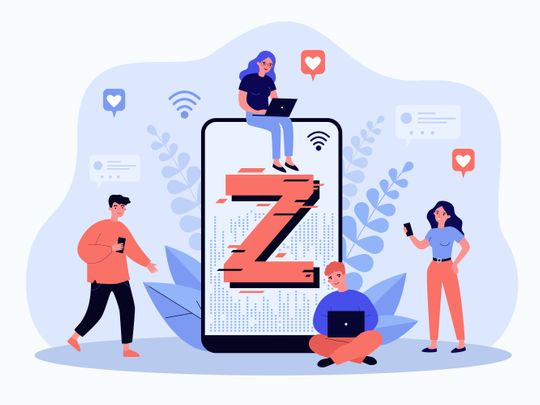
Look around your office – it’s likely you’re sharing your workplace with members of Gen Z, people born from approximately 1995 to 2010.
Click start to play today’s Spell It, where we learn how to support our youngest “teammate”.
Gen Z has faced a tough time even before clocking in at work – from worsening climate change to inflation, to disruptions in education from the COVID-19 pandemic. When Gen Z was entering the workforce, around the world, many people were being furloughed or fired.
According to the 2022 book Gen Z, Explained: The Art of Living in a Digital Age, this generation quickly gained a reputation for its mistrust of the status quo, disconnection, and impatience. It also became known for demanding immediate action on issues it cared about.
When it comes to the workplace, however, Gen Z has been struggling. According to a 2022 Gallup poll, 54 per cent of Gen Z employees – higher than any other generation – said they were ambivalent or not engaged at work.
If you’re a manager, how can you support your Gen Z employee, in order to gain their full engagement? Here are some strategies, according to a January 2023 report in US-based business management website, Harvard Business Review (HBR):
1. Increase information sharing
As the first fully digital native generation, Gen Z has grown up with comprehensive access to information, in real-time. But with the global pandemic, economic uncertainty around the world, and what the US Surgeon General called a “youth mental health crisis”, this generation is grappling with lack of control and uncertainty about the future. According to a January 2022 study by McKinsey & Company, Gen Z reported higher rates of anxiety, depression and distress than any other age group. So, to build trust, managers could shift their communication style from a ‘need to know’ policy to an ‘open access’ one. According to HBR, even if the news is bad – when supply chain issues are on the rise, or the business is underperforming – sharing it with Gen Z will alleviate their anxieties and allow them to process and feel in control.
2. Show them the path to career progression
According to a May 2020 report by US-based Pew Research Centre, “half of the oldest Gen Zers (ages 18 to 23) reported that they or someone in their household had lost a job or taken a cut in pay because of the [Covid-19] outbreak.” So, it makes sense that this generation wants to understand performance metrics, know where they should stand and how to overdeliver. Making sure it’s clear to them how they can succeed as individual contributors is key. Gen Z is also hypercognitive of pay equity – for instance, a TikTok account called Salary Transparent Street has over 1.1 billion views, and features people from different US cities sharing their profession and salary information. This generation expects employers to be open with them and affirm the organisation’s commitment to pay equity.
3. Explain how their contributions matter
According to the McKinsey research report, Gen Z is driven by purpose. People from this generation often make career and purchase choices based on their impact in the world, and want to further their understanding of what role they themselves play within their organisation. Gen Z doesn’t just want to understand their job roles and responsibilities, they want to know why it matters.
Do you work with Gen Z teammates? Play today’s Spell It and tell us at games@gulfnews.com.








